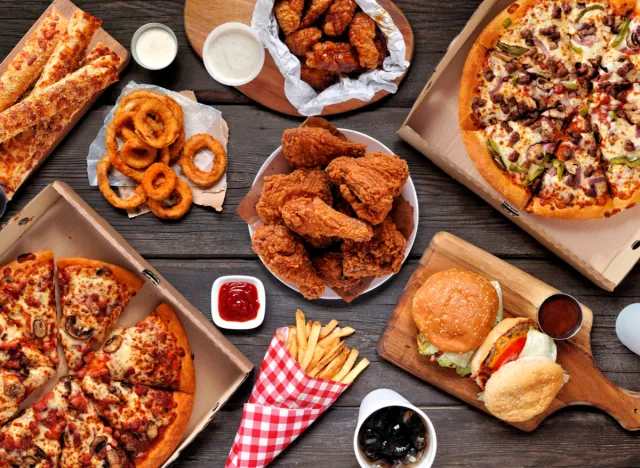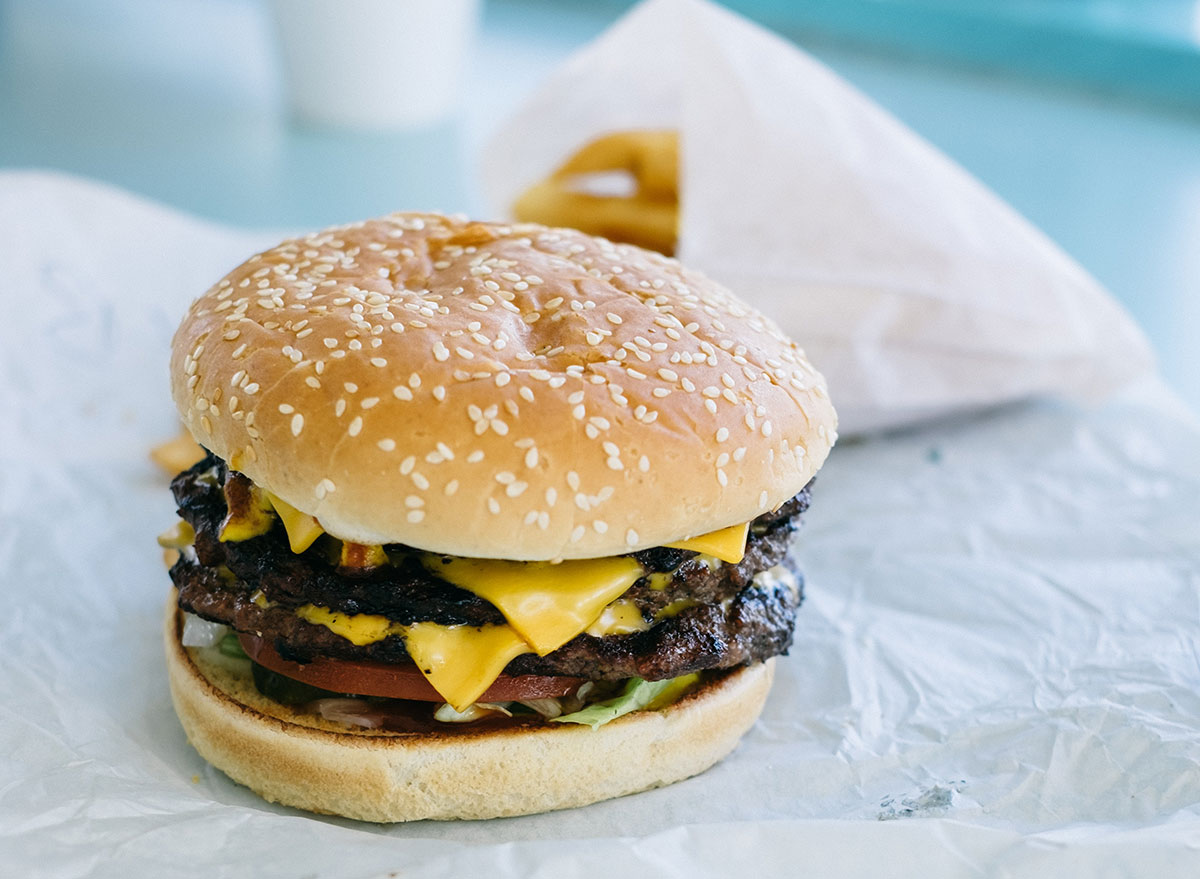What Eating Fast Food Can Do to Your Liver, According to New Research
It's safe to say that fast food comes with a hefty amount of negative side effects, and while affordable and convenient, it can potentially wreak havoc on your health if consumed on a regular basis. In the short term, this food is known to possibly cause a spike in blood sugar, increase blood pressure, and contribute to binge eating. Over the long term, consistent consumption of fast food may lead to an increased risk of obesity, heart disease, and type 2 diabetes. And now, as of this month, we know that this type of food may also contribute to non-alcoholic fatty liver disease (NAFLD).
A new study published in Clinical Gastroenterology and Hepatology discovered a connection between fast food and NAFLD, especially in those who are obese or diabetic. For participants with obesity or diabetes, their levels of liver fat increased significantly if a fifth of their daily diet contained fast food. For those without these conditions, this same amount of daily fast food increased the fat in their liver by a moderate amount.
In other words, if fast food takes up at least 20% of your daily diet, it can lead to moderate to severe fat buildup in the liver. These findings are crucial because, according to the study's primary author Ani Kardashian, this is one of the first studies to specifically link fast food and fatty liver disease.
Read on to learn more about these new research findings and what their implications could mean for you and your liver health. Then, for more healthy eating tips, make sure to check out 3 Additives You Should Avoid—And 3 You Don't Have To Fear.

The researchers gathered their information from the 2017–2018 National Health and Nutrition Examination Survey, in which they specifically pulled 4,000 participants' questionnaires who had included their fatty liver measurements. They then took these people and compared their liver health with their regular consumption of fast food. The study authors classified fast food as meals that someone could get from a drive-thru or in a restaurant without a wait staff, pizza included.
After studying the 4,000 participants, the authors found that 52% consumed at least some fast food on an occasional basis, and 29% of those consumers got 20% or more of their daily calories from fast food. Interestingly enough, the fast food-consumers who ate this food as at least one-fifth of their calories were the only survey participants who saw an increase in liver fat.
Unfortunately, too much fat stored in your liver can lead to non-alcoholic fatty liver disease, a term that applies to a multitude of liver conditions, and according to the Mayo Clinic, it's the most common form of chronic liver disease that occurs in the United States. But how exactly does fast food lead to excess fat in the liver?
The answer lies in trans fats. According to a report published in Nutrition & Diabetes, trans fatty acids contributed to a higher amount of fat stored in the liver. This type of fat is what you'd find in margarine, many frozen pizzas, processed baked goods, and fast food, and it often goes by the name of "partially hydrogenated oils."
When it comes to potential fat buildup in your liver, it's important to recognize that the type of fats you consume make a difference. As Amanda Lane, MS, RD, CDCES, founder of Healthful Lane Nutrition, once told Eat This, Not That! in a prior report on the #1 Best Eating Habit to Reduce Liver Fat, "Not all fats are created equally."
In fact, a different randomized controlled study presented at the 2022 International Liver Congress in London and editorialized by Medscape found that a low-carb diet that was also high in healthy fats could actually help to reduce liver fat. However, this was based on healthy fats, like those founds in nuts, salmon, avocados, or olive oil—not trans fats, which are found in fast food. Other research, including a Nutrients study evaluating the effects of nutritional changes on NAFLD based on nutrient type, also underscores a correlation between trans fat consumption and the likelihood of developing NAFLD.
"Highly processed fats like trans fats or even saturated fats are not as healthy for the body as unsaturated fats," said Lane.
So, what does all of this mean for those who enjoy eating fast food? While these findings may feel overwhelming in regards to the potential dangers of eating this type of food, a lot of it comes down to the quantity of your consumption. Fast food is convenient and affordable, and many people don't always have the option of eliminating it from their diet completely, but moderation is key. Those study participants who only ate fast food on occasion saw no effect on the fat in their liver. Whereas those who ate fast food regularly saw an increase in liver fat, which ultimately elevated their risk of NAFLD. To care for your liver and prevent the buildup of too much fat, try limiting your fast food consumption to the occasional, infrequent indulgence, and focus on maintaining a balanced diet when you're able.
- Source: https://www.ncbi.nlm.nih.gov/pmc/articles/PMC6711169/
- Source: https://www.ncbi.nlm.nih.gov/pmc/articles/PMC5952620/
- Source: https://www.ncbi.nlm.nih.gov/pmc/articles/PMC6196377/
- Source: https://www.ahajournals.org/doi/10.1161/JAHA.117.007651
- Source: https://www.cghjournal.org/article/S1542-3565(22)01137-5/fulltext
- Source: https://wwwn.cdc.gov/nchs/nhanes/continuousnhanes/overview.aspx?BeginYear=2017
- Source: https://www.mayoclinic.org/diseases-conditions/nonalcoholic-fatty-liver-disease/symptoms-causes/syc-20354567
- Source: https://www.ncbi.nlm.nih.gov/pmc/articles/PMC3302130/
- Source: https://www.medscape.com/viewarticle/976209
- Source: https://www.ncbi.nlm.nih.gov/pmc/articles/PMC6470750/










